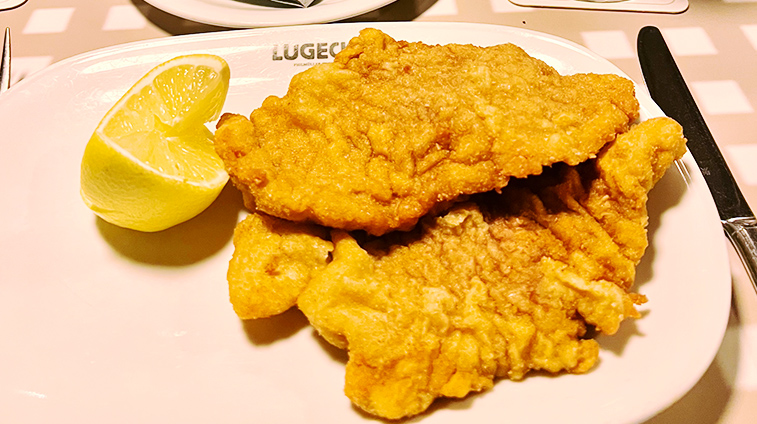
No one quite prepares you for the overwhelmingly grand setting Austria provides. From the classic art to the ornate architecture and stunning terrain, Austria is an imperial powerhouse, filled with grandiose experiences around every corner. With strong Germanic roots, though, Austria’s culinary gem is a reminder that simple food can be spectacular in a magnificent setting.
On a recent trip to Vienna, I certainly tried my fair share of schnitzel. After days spent taking in Klimt paintings and walking through too many palaces to name, schnitzel was the perfect hearty treat for dinner. One would assume that a city of such grandeur would have a cuisine to match, but Vienna proves that even emperors and empresses appreciate a good piece of fried meat.
How It’s Made
In many other countries, schnitzel can be made with chicken, beef, pork, or turkey, but for a traditional Austrian wiener schnitzel, veal is the only option. Veal chops are pounded as thin as possible to create a tender base, then they are dredged in flour, egg, and breadcrumbs. After that, schnitzel is fried in lard or clarified butter at an extremely high temperature. Since the fat is so hot, schnitzel fries right up in a matter of seconds and is delivered right to your table.
When possible, one of my favorite things to do at a restaurant while traveling is ask for a seat near the kitchen. Sometimes, sadly, restaurant kitchens are in the basement or hidden in the back of the restaurant, but on a lucky, rare occasion, the kitchen is open or partially open for patrons to observe. I had the chance to peek into a few restaurant kitchens in Austria, where chefs were dutifully preparing pounds and pounds of schnitzel. Hearing mumblings of German as they speedily moved the veal through the breading process and into the fryer was one of the most fun experiences of my entire trip. Based on the demeanor and work ethic of these chefs, it is clear this dish is a source of immense national pride.
How It’s Enjoyed
Schnitzel is typically served with a side of potato salad or boiled potatoes with parsley and lemon wedges. It’s fitting that the accompaniments are just as understated as the dish itself. It arrives at the table with no pomp and no circumstance, just a hunk of fried meat and a bowl of potatoes. Exactly what anyone would want to eat after a big day of taking in what this beautiful country has to offer. In my opinion, what really makes a schnitzel dinner is the perfect glass of crisp white wine. Grüner Veltliner is the name of Austria’s most prominent wine, which became popular only in the last few decades. It is essential to a classic schnitzel dinner, and a good-quality bottle is typically available at an affordable price. It has citrusy notes that pair wonderfully with the hint of lemon juice spritzed over schnitzel, making it the perfect fresh counterpart to a hearty meal. There are often a few different bottles of Grüner Veltliner available on Austrian restaurant menus, and the waitstaff I encountered were proud to see a tourist drinking local wine and happy to help me pick the right bottle. Once they realized I was looking for a true Austrian experience, wine and all, they were eager to help recommend a favorite coffee shop or lesser-known museum to explore in my travels.
After Schnitzel
Now, dessert is another story in Austria. Walk into any Viennese pastry shop, and your senses will be overwhelmed by the sheer opulence of what you find. Intricately decorated cakes, ingredient pairings you would never think of yourself, and ornate candies are everywhere. It is the literal opposite of the simplicity of a schnitzel dinner. My favorite days in Vienna were spent in awe at the architecture and culture, broken up by an understated schnitzel dinner, with a return to opulence for dessert. Sacher Torte, anyone?

